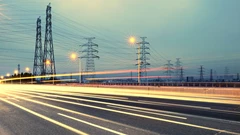Ex-Nuclear Watchdog Chief Urges Japan to Win Atomic Support
(Bloomberg) -- Japan’s government needs to do more to win public support for the restart of nuclear plants as an energy crunch puts the spotlight on atomic power, according to the industry’s former top regulator.
“The government needs to confront its people and have a proper discussion,” said Shunichi Tanaka, who served as the chairman of Japan’s Nuclear Regulation Authority. “Japan has no energy source of its own-- and on top of that, there’s climate change and issues surrounding Russia to consider.”
Tanaka’s comments come amid renewed debate over the role of nuclear power in Japan, still a politically sensitive issue after the 2011 Fukushima disaster.
Homes and businesses are being asked to conserve electricity to help avoid blackouts during a squeeze on global energy supplies. The war in Ukraine has sent coal and gas prices to record levels and raised costs for energy importers like Japan, while the situation is being made worse with the yen at its weakest in two decades.

With power supply expected to be tight through summer and again in the coming winter, several lawmakers have called for quicker restarts of nuclear reactors that have been offline since 2011. Of the 33 commercially available fleet, only 10 have restarted under the authority’s rigorous protocols.
“The public today in general doesn’t see it as a positive thing to turn nuclear power online,” said Tanaka, who led the regulatory body between 2012 and 2017. “The government needs to clear that hurdle.”
Prime Minister Fumio Kishida has said he wants to make the inspection process at the regulatory body more efficient and effective, and Japan wants nuclear power to make up 20% to 22% of its energy mix in 2030, from about 7%.
Some members of Kishida’s ruling party have proposed allowing reactors that have passed safety standards to go online, even if they haven’t yet implemented some other measures, like adding facilities to take over operations in the event of a terrorist attack.
But Tanaka disagrees with the government’s calls. The 77-year-old, who has a background in nuclear engineering, insists quicker restarts should not undermine safety, and argues atomic power plants are crucial to achieve energy security and cut carbon emissions.
“I personally think that nuclear power is the most important scientific invention that human kind has obtained,” he said. “Using it properly is very important for humanity.”
More stories like this are available on bloomberg.com
©2022 Bloomberg L.P.
KEEPING THE ENERGY INDUSTRY CONNECTED
Subscribe to our newsletter and get the best of Energy Connects directly to your inbox each week.
By subscribing, you agree to the processing of your personal data by dmg events as described in the Privacy Policy.
More utilities news

Zambia Paid $82 Million to China Before Debt Revamp Deal

Canada to End 30% Stake Limit to Boost Pension Fund Investment

Turkey’s Aydem Group Plans 2025 IPOs for Power Grid Operators

Germany’s Record-Beating Stocks Head for Further Gains in 2025

Equinor takes FID on UK’s first carbon capture projects at Teesside

BMW, Mercedes Add New Executives as Carmakers Tackle Crisis

Thames Water CEO Steers Away From Break Up After Covalis Bid

Germany Expecting Tight Power Conditions as Wind Output Falls

Nuclear Power Not Cost-Effective in Australia, Science Body Says
















